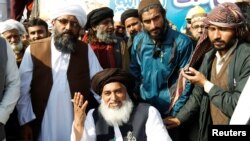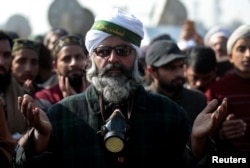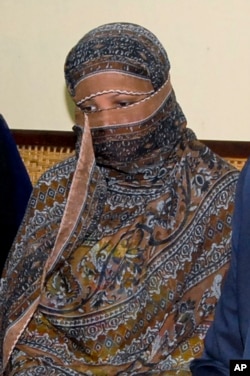Pakistanis have had mixed reactions to the government's decision to detain Khadim Rizvi, a radical Islamic cleric and founder of Tehreek-e-Labbaik Pakistan (TLP), a religious-turned-political party with extreme views on the country's blasphemy law.
Authorities took Rizvi into custody in Lahore last week as part of a larger government crackdown on the group's leaders and members across the country, particularly in Punjab province, where the group has large followers.
WATCH: Who is Khadim Rizvi?
Hundreds of others associated with TLP have also been detained.
"No one who halts the country, incites hatred and issues Islamic decrees to kill others should be spared. It is against the law and the constitution," Salman Abid, a Pakistan-based political expert, told VOA.
Abid said Rizvi's detention is a reminder for all who would create a state within a state and play with people’s religious sentiments.
"TLP has repeatedly used derogatory comments for government institutions, the Supreme Court, judges and politicians. They were using politics as a tool for their own agenda. They were using media to promote their extreme ideology. The government has done the right thing," Abid added.
Keeping quiet
However, most who support the blasphemy law are keeping silent because of the government's crackdown on TLP supporters, analysts say.
TLP staunchly supports implementation of the law and has used the issue as a platform to add followers, contest elections and launch widespread, often violent protests in the country.
Since its emergence in 2017, TLP has arranged numerous protests, some of which have turned violent and paralyzed major cities across the country for weeks.
Rizvi is from the Attock region in Punjab province. Prior to establishing Tehreek-e-Labbaik Pakistan, the cleric worked in a mosque in Lahore and delivered Friday sermons to the local community.
Rizvi has also worked as a government employee in Punjab's religious affairs department. He lost his job after he continued to encourage violence in support of the blasphemy law.
He has openly and repeatedly justified violence against those in the government who attempt to alter the blasphemy law.
Rizvi was arrested after refusing a government's demand to withdraw a call for arranging a large gathering in the capital, Islamabad.
Fawad Chaudhry, Pakistan's information minister, confirmed in a tweet last week that Rizvi had been taken into "protective custody and shifted to a guest house" to preserve public order.
"The action was prompted by TLP's refusal to withdraw its call for protest on Nov. 25. It's to safeguard public life, property and order, and has to do nothing with [the] Asia Bibi case," Chaudhry said.
Violent rallies
Rizvi's arrest came weeks after TLP held violent rallies in Pakistan to oppose last month's acquittal of Bibi by Pakistan's Supreme Court.
Bibi, a Christian woman accused of committing blasphemy, had served eight years in prison and was sentenced to death over accusations of insulting Islam's Prophet Muhammad.
Following her acquittal, TLP arranged large protests that paralyzed several cities across the country for three days. During the protests, TLP's leadership had openly incited its followers to kill the judges who ordered the release of Bibi.
Rizvi ended the protests after the government agreed that Bibi would not leave Pakistan until a petition against her acquittal was reviewed.
Ayaz Amir, a Pakistan-based journalist, said Rizvi had "become a danger for Pakistan's safety, and his arrest was necessary to avoid any fresh series of violent clashes and protests."
"Rizvi had called [on TLP] followers to gather in Islamabad, which meant the closure of the capital, and the government wanted to avoid it at any cost. We have seen what happened after Bibi's acquittal. So, the government had taken a precautionary measure to avoid any violence, and rightly so," Amir added.
The government has not yet said how long the TLP leaders and followers will be held, but legal experts in Pakistan said they could be legally be detained from 30 to 80 days.
TLP members did not return multiple calls for comment. Before the crackdown, however, the group's spokesperson told VOA that they would not back down.
Pardon 'is not permitted'
"This is a religious matter. The Christian lady has committed blasphemy and admitted of using derogatory language against Prophet Muhammad," Ejaz Ahmad, the TLP spokesperson, told VOA.
"According to Islamic law, it is not permitted to pardon her. We cannot allow this to happen. We will raise our voice and launch protests throughout the country," he added.
Some analysts also saw Rizvi's detention as a rare sign of strengthening civilian-military relations and cooperation.
Amir, the Pakistan-based analyst, said, "There is no division" between the civilian and military sectors, and that is "adding to the strength of Prime Minister Imran Khan, who makes tough calls without hesitation."
Imran Malik, a retired Pakistani brigadier and security analyst, told VOA, "TLP's behavior is not justified. Look what they did after Asia Bibi's acquittal and how brutally everyone in the country criticized the government for not being able to stop them."
Malik added that the government and the military could work together to deal with extremist elements like TLP.
Inspired by Taseer's killer
Tehreek-e-Labbaik Pakistan was created in 2017 and is registered with Pakistan's Election Commission. The party was able to secure 2 million votes in the general elections held earlier this year.
TLP has been inspired by the actions of Mumtaz Qadri, a security guard who in 2011 killed Punjab Gov. Salman Taseer because of his demands for reforms to the blasphemy law.
Qadri was later sentenced to death and executed in 2017, and he has been seen as a hero by TLP members.
VOA's Urdu service contributed to this report.









